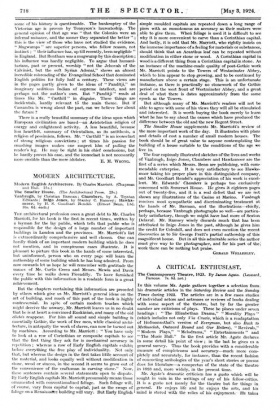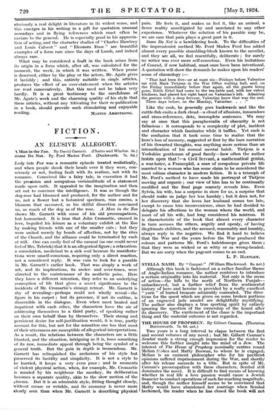A CRITICAL ENTHUSIAST.
The Contemporary Theatre, 1923. By James Agate. (Leonard, Parsons. 7s. 8d. net.)
Ix this volume Mr. Agate gathers together a selection from; his dramatic articles in the Saturday Review and the Sunday. Times during 1923. The articles are in a few cases studies of individual actors and actresses or reviews of books dealing with some aspect of the theatre, but by far the greater number are criticisms of plays. These he places under seven headings : " The Elizabethan Drama," " Morality Plays " (which includes not only Via Crucis, which is a readaptation of Hofmanr.sthal's version of Everyman, but also Back to Methuselah, Outward Bound and Our Betters), " Revivals," " Modern Plays," " Melodrama," "Entertainments " and " The Music Hall." In the first article Mr. Agate declares in some detail his point of view ; in the last he gives us a general survey. Thus the book provides with a considerable measure of completeness and accuracy—much more com- pletely and accurately, for instance, than the recent fashion of concocting anthologies of the year's short stories or poems does for literature—a conspectus of the state of the theatre in 1923 and, more widely, in the present time.
Mr. Agate's dramatic criticism has a gusto which will be sought in vain in the writings of any of his fellow-critics. It is a gusto not merely for the theatre but for things in general. He enjoys life and he enjoys the arts, and his mind is stored with the relics of his enjoyment.- He takes
obviously a real delight in literature in its widest sense, and this emerges in- his writing in a gift for quotation unusual nowadays and in flying references which must often be caviare to the general. He is especially good in his apprecia- tion of acting, and the character studies of "Charles Hawtrey and Louis Calvert " and " Eleanore Duse " are beautiful examples of a form rare since the days of Lamb, and indeed always rare.
What may be considered a fault in the book arises from its origin in a form which, after all, was calculated for the moment, the week, in which it was written. When praise is deserved, either by the play or the actors, Mr. Agate gives it lavishly ; and this, entirely suitable - in single articles, produces the effect of an over-statement when the articles are read.consecutively. But this need not be taken very hardly. It is a great testimony to the carefulness of Mr. Agate's work and the charming quality of his style that these articles, without any titivating for their re-publication in a book, should provide such stimulating and enjoyable















































 Previous page
Previous page